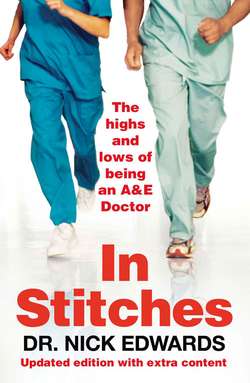Читать книгу In Stitches - Nick Edwards, Dr. Nick Edwards - Страница 10
No notes
ОглавлениеThe ambulance pulled up and the paramedic came out. ‘Nick, we need to take him to Resus. His pulse is only 30.’ It seemed a reasonable request so I went off to Resus to see him.
The patient was 80, lived alone and had no close relatives. He had dementia and received care four times a day. The carer had called the ‘out of hours’ GP because his catheter was blocked, he couldn’t pass urine and his stomach was starting to ache. The GP told them to come to A&E as the out-of-hours service was too busy. A much better course of action would have been for them to go and ‘unblock’ the catheter, but that is a moan for another day.
I examined him and, apart from having a blocked catheter, the main problem was his pulse of 30 (normal is about 60). His ECG showed ‘complete heart block’, a condition that makes the heart beat very slowly. His blood pressure was normal, so it wasn’t an immediate life-threatening event, but heart block can be very serious, particularly if it is a new condition.
I asked the patient about it. He didn’t really understand what I was talking about. The carer didn’t know. I phoned the out- of-hours GP, but they can’t access regular GP notes outside working hours. The carer didn’t know anything about his heart condition, and there were no relatives available to ask. I asked our receptionists to get his old notes urgently as I needed to know what was going on. Would he need to go to the cardiac unit urgently or could he go home?
The A&E receptionist said that she couldn’t get hold of the notes. They were in a secretary’s office awaiting ‘typing’ and no-one could get hold of them. I moved on up the food chain and called the hospital ‘Site Manager’, the most senior person present in the hospital in the evening.
‘I need them urgently’, I pleaded.
‘Unfortunately, we can’t,’ I was informed.
‘It is life threatening. Please can we get them?’
‘Computer says no’ (OK, she didn’t actually say that, but it was something to that effect).
I had to practise safe medicine, so I referred him to the medical doctors to be monitored on the cardiac care unit (CCU). I explained that I thought it was a chronic problem, but that I wasn’t prepared to take the risk. They agreed and he went to the CCU.
In the morning, when the cardiologists were debating what to do, the GP was called and the hospital notes obtained. It was soon found that he had had this condition for five years. He had been referred for a pacemaker, but had refused one as the condition had never bothered him. The GP also explained that when the patient had been ‘with it’ he had always said that he never wanted to go for a hospital for a pacemaker. This pretty much swung the treatment plan into discharging him back home.
However, this visit put him at risk of hospital-acquired infection, and took up the last bed on the CCU, which might have prevented someone who would have genuinely benefited from coming to CCU from being there. And why? Because we couldn’t get hold of his old notes outside office hours. It is so frustrating to work in a system like this – what a waste of money. This happens time after time after time – unnecessary admissions occur, expensive tests are repeated and patients are not being cared for properly – all because of poor accessibility of patient records.
The government sees that this is happening and that is why it is currently spending zillions and zillions of pounds on a new computer system. Unfortunately, this system is taking ages to be implemented. Until it is, couldn’t we do something like, say, getting GPs to give every patient/or their carer a summary of their notes to carry around with them? Currently, even if I can get hospital paper notes, I can’t get access to GP records of patients’ latest drugs
Going back to the computer system they are implementing, I say thank you. It is about time too, but why is it taking so long and why the hell is it costing so much? I know it is complicated, but all I want is a system where a patient comes in with an NHS ID card, we swipe it and know what medications they are on, what they are allergic to, any past medical conditions and, perhaps, get a copy of an old ECG. And when they get a new condition or drug change, the doctor can change the ‘care record’ then and there.
We don’t need some fancy thing with ‘choose and book’ and Internet blardy, blah, blah. We just need something that works and we need it now. If Tesco can know exactly what I have bought every week for the last few years and have brought that IT system in at a fraction of the cost of the NHS’s one, can’t we steal their IT manager? Or Sainsbury’s Nectar card computer bod? Without easy access to patient records, we provide worse and more expensive care. Hurry up computer people, please.
